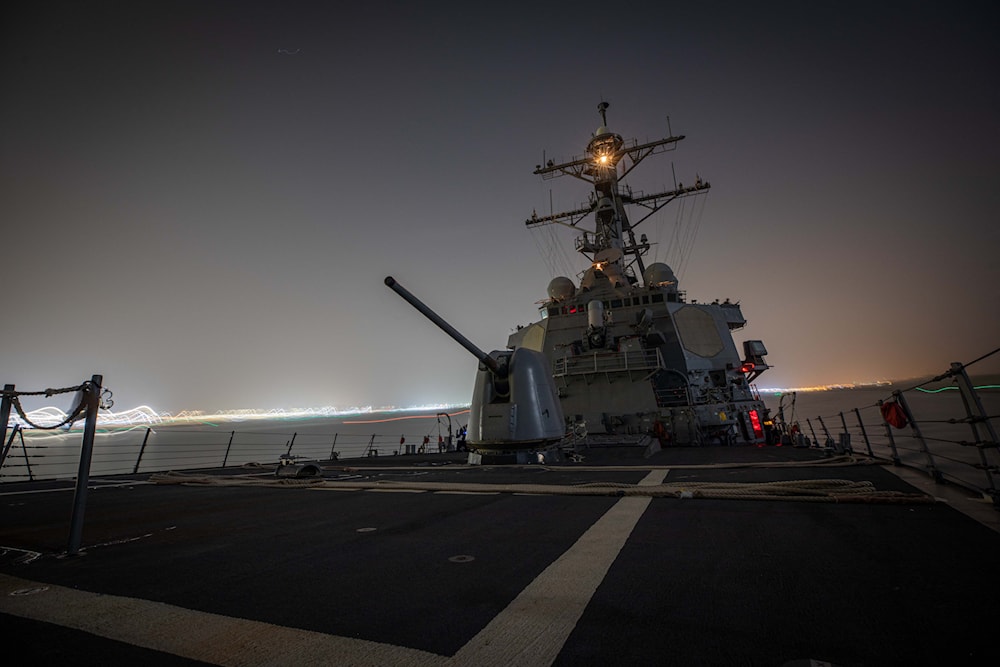US concern over cost of intercepting Yemen's Red Sea attacks: Politico
Pentagon officials say concerns are mounting over the use of expensive US naval missiles to intercept relatively inexpensive Yemeni drones.
-

In this image obtained from the US Department of Defense, the Arleigh Burke-class guided-missile destroyer USS Carney transits the Suez Canal on November 26, 2923. (Photo by Aaron Lau / US Department of Defense / AFP)
In a report under the title A $2M missile vs. a $2,000 drone: Pentagon worried over cost of Houthi attacks, Politico reported the concern within the Pentagon regarding the cost imposed by the operations of the Yemeni Armed Forces in the Red Sea.
Sanaa vowed that no ships bound for the Israeli occupation entity nor any Israeli vessels would be allowed to pass through the Red Sea until needed aid is allowed to enter Gaza as the stifling Israeli blockade on the Strip continues to claim more lives and worsen the living conditions of the Palestinian people amid the ongoing aggression.
The report highlighted that the Pentagon has deployed a substantial arsenal to the area, with two carrier strike groups, the Gerald R. Ford stationed in the eastern Mediterranean and the Dwight D. Eisenhower positioned in the Gulf of Aden. Additionally, at least four destroyers and a cruiser are currently conducting patrols close to the Bab al-Mandab Strait.
According to the report, "Pentagon officials are increasingly alarmed not just at the threat to U.S. naval forces and international shipping — but at the growing cost of keeping them safe."
The news website cited a Pentagon official as saying that over the past two months, US Navy destroyers have intercepted 38 drones and multiple missiles in the Red Sea, adding that on a single day, the USS Carney intercepted 14 one-way attack drones.
Politico cited three other US Department of Defense officials as saying that concerns are mounting over the use of expensive naval missiles—costing up to $2.1 million per shot—to intercept relatively inexpensive Yemeni drones, estimated at a few thousand dollars each.
"The cost offset is not on our side," one official indicated.
This cost disparity raises questions about seeking more cost-effective air defense options, the report said.
"That quickly becomes a problem because the most benefit, even if we do shoot down their [Yemen's] incoming missiles and drones, is in their favor," Mick Mulroy, a former DOD official and CIA officer, was quoted as saying.
"We, the U.S., need to start looking at systems that can defeat these that are more in line with the costs they are expending to attack us," he stressed.
In response to the operations being carried out by the Yemeni people in support of occupied Palestine and the people of Gaza, the United States military launched a new coalition in the Red Sea called "Operation Prosperity Guardian," under the guise of securing maritime trade routes. The United Kingdom, Bahrain, Canada, France, Italy, the Netherlands, Norway, Seychelles, and Spain will be among the countries jointly working with the Pentagon under the coalition.
A senior US administration official told Politico that the task force comprises 19 nations, among them some Arab ones, though only nine have chosen to publicly align themselves with this coalition.
In recent days, both Western media and shipping conglomerates have attempted to frame the Yemeni Armed Forces' operations as a threat to international trade. However, Yemen's military has made it clear, in every statement announcing a strike on a vessel, that its operations only target ships heading to Israeli ports or Israeli-owned ships. The Yemeni Armed Forces have also reassured all other vessels of safe travels if they successfully identify their final destinations.
Read more: Ships captured in Yemen to only leave on Palestine's terms: Exclusive

 4 Min Read
4 Min Read








